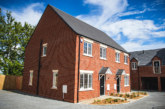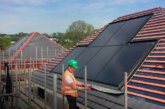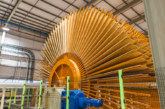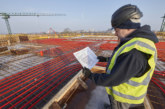Three quarters of the construction industry believes that the sector’s climate objectives are unachievable unless there is a major overhaul to how homes in the UK are built and refurbished, research has revealed.
The government has set a number of environmental targets for the construction industry in order to meet its overall objective of reducing the UK’s greenhouse gas emissions to net-zero by 2050i. In a survey of over 200 construction industry professionals, 77% of respondents agreed that these environmental goals will not be achieved without significant changes in the approach to retrofitting existing homes and developing new homes.
The research by Uponor, the total solutions provider of systems for the safe transportation of water around a building, is detailed in the whitepaper ‘High-Rise and Net-Zero Buildings of Tomorrow: Is the Construction Industry Ready?’
The research also revealed that:
- Half of those questioned don’t think it will be possible to disconnect all new homes from the gas grid by the Future Homes Standard’s deadline of 2025. This brings into question the even shorter 2023 deadline Boris Johnson unveiled in his ‘green industrial revolution’ plan
- Only 10% of respondents feel the industry has enough support to deliver low carbon homes
- 70% of respondents say more training is needed to create low carbon homes
This research aligns with recent criticism by independent housing organisations, which believe that government policies do not sufficiently support sustainable building practises. This includes the Chartered Institute of Housing (CIH), which recently raised concerns about the government’s Planning White Paper and its ability to help reduce carbon emissions.
Zisis Nikoloudis, Commercial Segment Manager at Uponor, said: “Our research uncovered scepticism in the construction industry regarding its ability to meet the government’s environmental objectives – showing that there are still lots of sustainability challenges to overcome.
“Among these challenges are the efficiency levels of HVAC systems and heating networks. At Uponor we’re well aware of the important role these systems play in creating sustainable housing, which is why we work hard to develop solutions that help create a greener built and living environment.
“If efficient systems are not made the norm and inefficient systems that consume vast amounts of energy or that waste heat through distribution are not taken out of the existing housing stock and disregarded for new-builds, then it will be difficult for the construction sector to meet its environmental targets. It is important that awareness of sustainable solutions, such as low water temperature systems and low thermal loss heating networks, is increased. If smart systems like these are embraced by new-build and refurbishment projects then it will help the industry in its route to achieving net-zero carbon status.”









